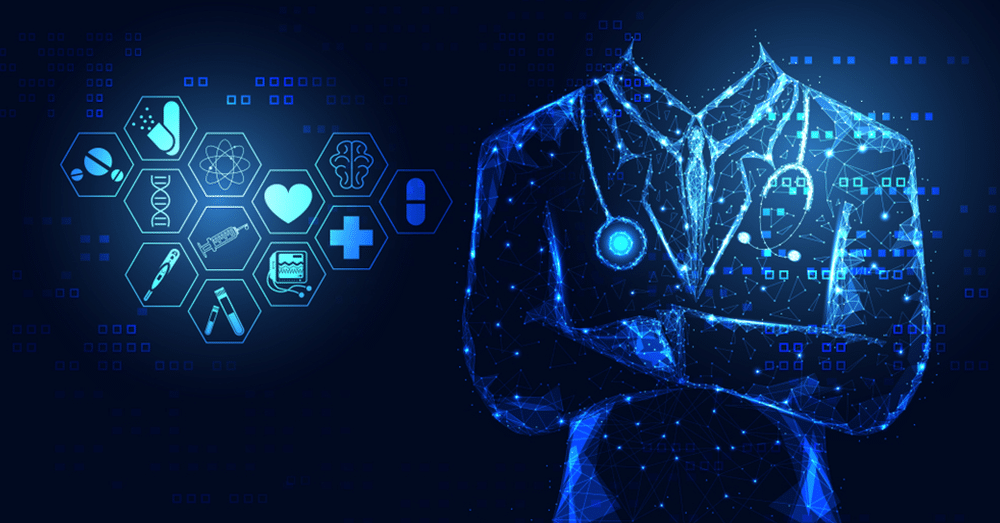
Gone are the days when you needed to wait long hours to see a doctor and stand in lengthy queues to buy your medicines. In this era of technological advancement, where every industry is moving ahead befriending technology, healthcare is no new to accept this. With moving time and upgrading lifestyle, traditional healthcare facilities have evolved.
The amalgamation of health and technology has brought-in solutions like telemedicine, digital health checkers, robotic health monitors, virtual assistants, and much more, which has reduced patient’s/people’s dependency on relying upon traditional methods of seeking medical help. Now, seeing a doctor, buying medicines, and checking bp are all possible from the comfort of your homes with the use of telemedicine.
Technologies like Artificial Intelligence, Virtual Reality, Augmented Reality, 3D Printing, Nanotechnology, and Robotics help the healthcare industry change for a lot better. The ongoing pandemic can be a perfect example of how technology is going hand in hand with healthcare to better manage people’s health. Software Solutions like Electronic Health Record Management Systems (EHR) and Hospital Management Systems equip hospitals to better manage their patient-related data and contain the virus’s spread.
Looking at The Brighter Side
For healthcare and medicine, technology can transform this unsustainable system into a more environmentally safe and sustainable system, equalize the relationship between healthcare professionals and patients, and provide a faster, cheaper, and more effective solution for diseases.
This is evident as technologies help us win the battle against deadly diseases like cancer, AIDS, Ebola, etc. Moreover, the latest digital disruptions in healthcare make us more vigilant, careful, and responsible for our health, as devices like smartwatches and health bands help us regularly monitor our ailments. Seeing this as a newly evolved marketing opportunity, various mobile apps development companies develop apps that provide easy health monitoring.
Throwing more light on healthcare and related technological disruptions, this article will talk about nine ways in which technological advancements shape the healthcare industry’s future.
Artificial Intelligence
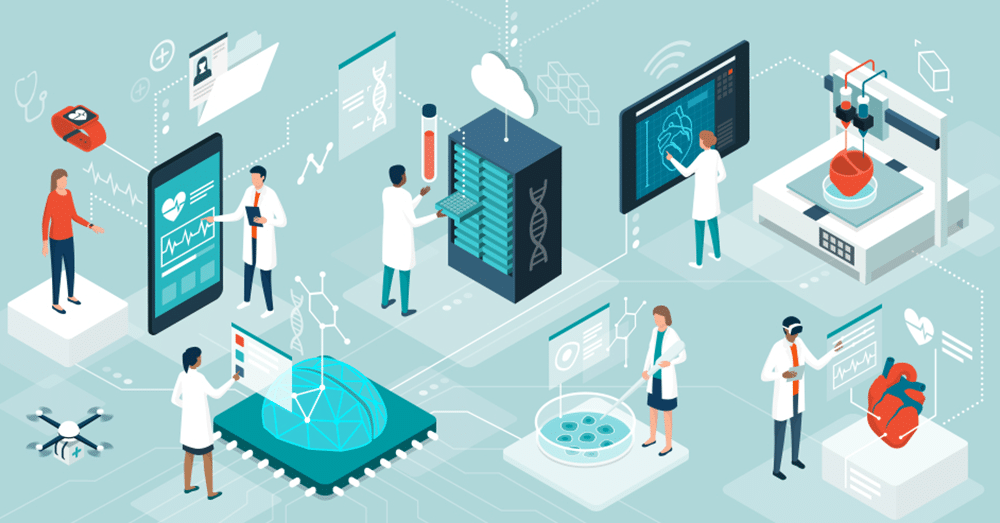
The development and theory of computer systems able to perform tasks usually requiring human intelligence, such as visual perception, decision making and speech recognition, is called Artificial Intelligence.
AI has the potential to transform the whole healthcare industry. From monitoring patient’s symptoms to customizing their treatment plan, AI algorithms do it all. Artificial Intelligence assists doctors in performing the surgeries and in diagnosing and maintaining various diseases. The AI algorithms help in mining medical records and creating drugs way faster than any other medical professional.
Be it the physiological or mental health; AI has solutions for all. Niramai, a leading health-tech startup, uses AI-based technology to diagnose breast cancer. Their solution is a low cost, automated, accurate, and portable cancer screening tool easily operated by a clinician. Mental health has become a subject of most significant importance; Sentio Solutions, A USA based company, provides an AI-based solution for monitoring anxiety and depression.
Big giants like Google and IBM provide Ai based solutions in data mining. Google Health/Deep Minds has come up with an AI-based solution to identify breast cancer, and IBM’s health branch Watson Health provides AI-based solutions for cognitive computing.
AI can assist medical professionals in routine and monotonous jobs, enabling them to concentrate better on their actual tasks. The medical AI field is buzzing with opportunities; more and more companies are integrating their healthcare solutions with AI.
Virtual Reality
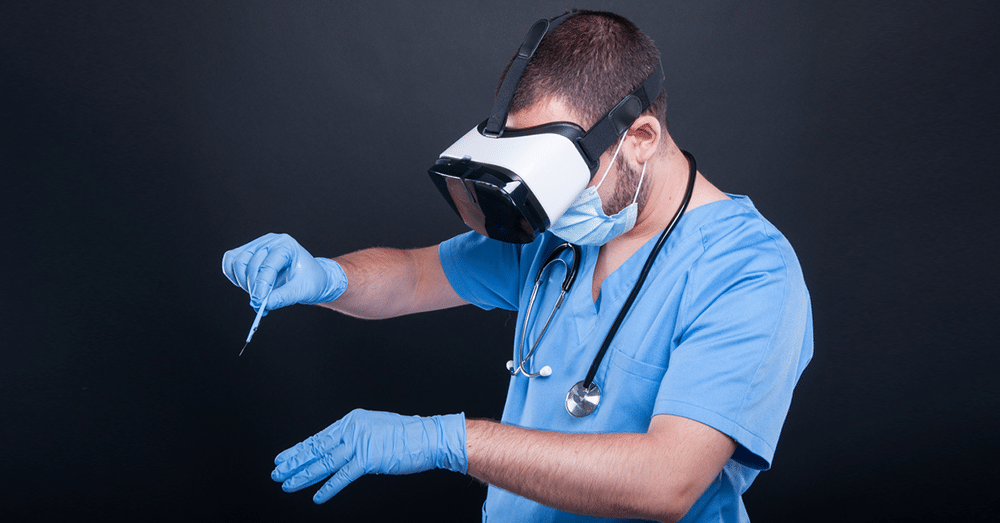
Virtual Reality is a simulated experience generated through the use of computer technology. Here, users are placed inside an experience to effectively interact with the 3D world using VR sets.
This technology is changing the lives of patients and doctors for the better. In the future, you might see operations through VR and experience it as if you are holding the scalpel to operate the patient, and it wouldn’t be a surprise to see a patient experiencing a wonderland ride while lying on the hospital bed.
This technology has made learning even more easy for amateur doctors. Now, they can be trained to perform surgeries through Virtual Reality. VR technology is also helping patients as it has proven effective in pain management.
Doctors use VR headsets for women undergoing labor pains. The VR headsets take them through visual and soothing landscapes, which help them get through the pain. Also, patients suffering from cardiac, neurological, and post-surgical pain have shown a decline in the pain levels when using VR to distract them from pain. It has also been found useful in relaxing pre-surgery anxiety in patients. Here is a video of how VR is used to treat patients.
Augmented Reality
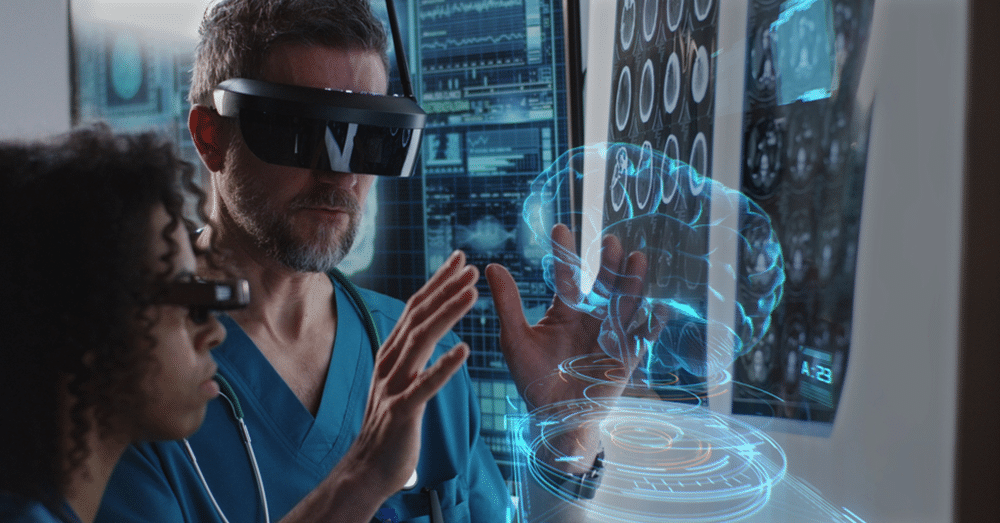
Augmented Reality is a real-world interactive experience, where computer-generated perceptual images enhance objects residing in the real-world. Here, users do not lose touch with Reality as VR puts information into their eyesight as fast as possible.
These features make AR a driving force in the future of medicine. Like VR, AR too helps ametuer doctors to prepare for their future surgeries and enables them to enhance their skills better.
It also allows medical students to study anatomy. Using VR, medical students can get access to study detailed and accurate, albeit virtual, depictions of the human anatomy without human bodies’ need (Microsoft HoloLens App). Here is a video of the future of AR in healthcare.
Health Trackers and Wearables
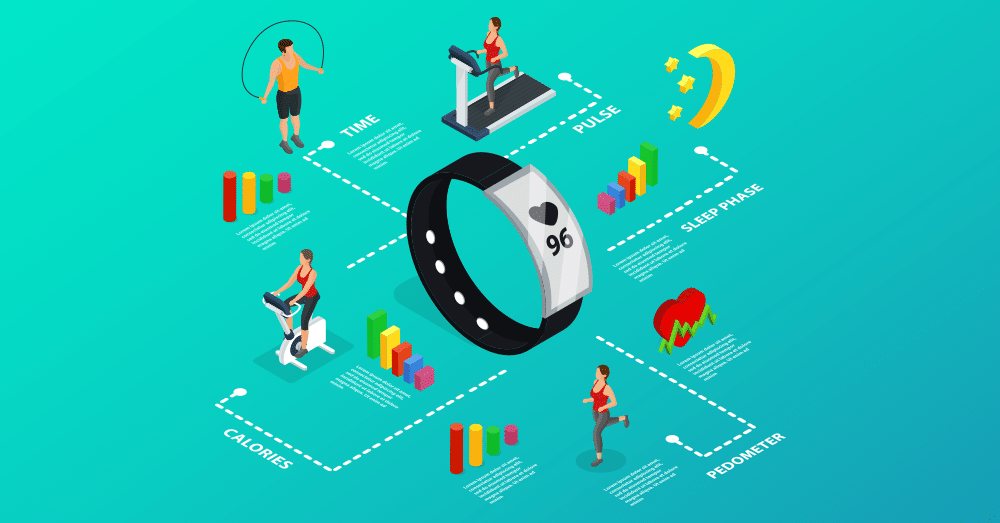
The future of healthcare is all about making informed choices. With changes in lifestyle and working patterns, health and its monitoring patterns have also changed. Problems like obesity, blood pressure, diabetes, hypertension, and stress are becoming very common. As all these ailments are related to poor lifestyle management, products like electronic/digital health monitors have made a place in people’s lives.
The monitors come in the form of wearable bands and, with the help of AI and machine learning, monitor real-time data to better manage health. These devices provide features like step trackings, sleep tracking, diet management, calorie counter, heart rate and pulse measuring, bp monitoring, etc.
Brands like Fitbit and GOQii are the top solution providers in this segment. Their wearable health bands provide accurate data in terms of better health management. With this technology disruption, the healthcare industry has developed a new and emerging market.
Various mobile application development companies are creating health monitoring applications. These applications enable people to better manage their health by providing information about their ailments like stress, weight management, sleep management, etc. Some good examples can be MyFitnessPal, BeatO, Fooducate, etc.
The beauty of these new tech-fueled devices lies within their approach of making patients a point of care by helping them make better and informed choices about their health.
Portable Testing Equipment
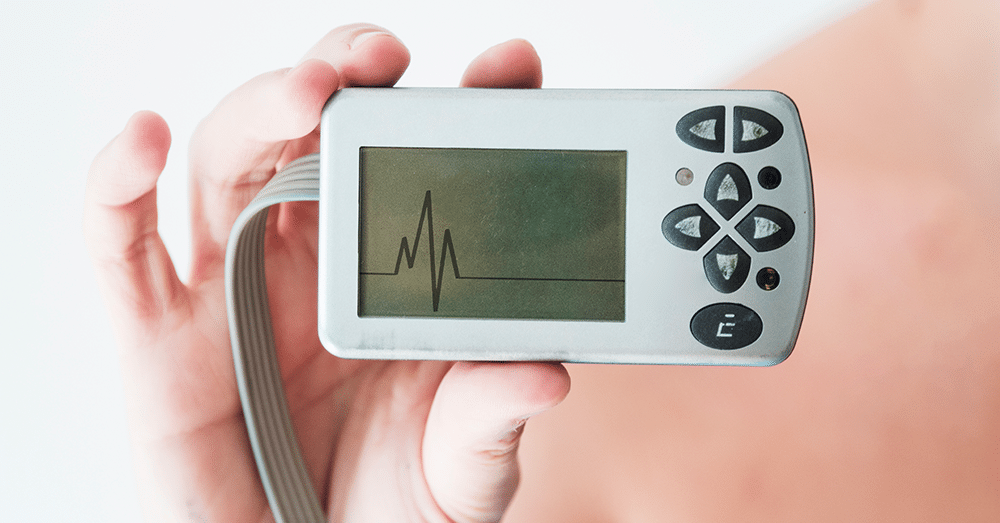
In terms of diagnosis and testing, technological advancement has helped the healthcare industry reach a new high. In today’s time, diagnosing critical ailments like brain haemorrhage, breast cancer, and cardiac arrest can be made through portable devices. For enabling the same, artificial intelligence and machine learning have played a big part.
The Viatom CheckMe Pro is an example of one such palm-sized gadget which can measure heart rate, ECG, oxygen saturation, temperature, blood pressure, and much more. Technology innovations have also led smartphones to provide features like high-power microscopic diagnosis and detection of several other diseases. Today, almost anything can be synchronized to a smartphone for augmentation of its features.
Revolution in Drug Development

Advancements in technology have helped the pharmaceutical industry to enable a quick and less expensive drug development mechanism. Taking the example of the current vaccine and drug development, the pandemic has created an urgent need to find the right preventive solution.
Technologies and Gadgets like AI, MI, and humanoids (a machine-like human, based on mathematical models) help various medical professionals engaged in the trials.
Artificial Intelligence and Machine learning are extending continuous support to the pharma industry for doing and compiling their research results. AI in the drug discovery market is expected to gain growth in the forecast period of 2020 to 2027. For a detailed report on the same, you can refer to the following research article.
Robotics
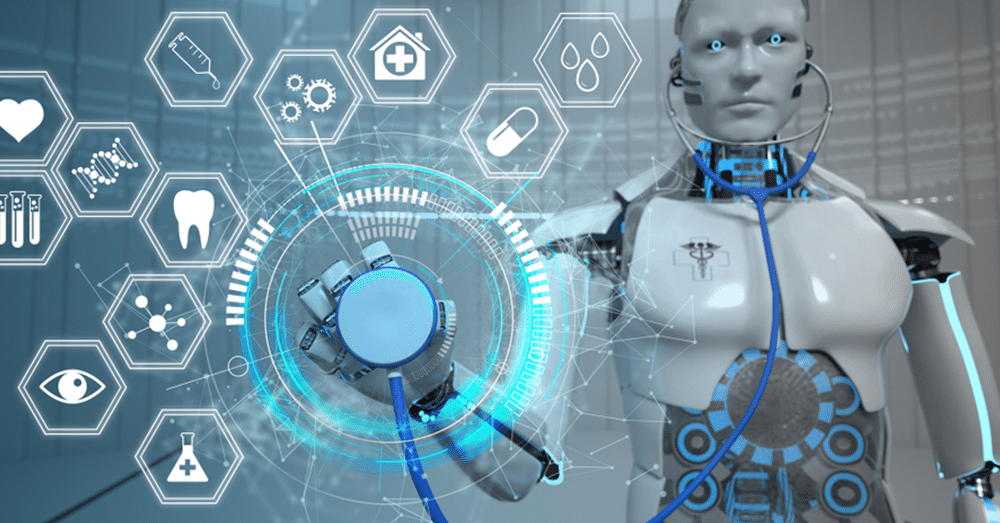
One of the fastest-growing fields of health tech is Robotics. Here, technology has enabled robot companies to develop robotic solutions for surgeries and medical assistance. Today, critical surgeries like cardiac, brain, and amputation are majorly performed through robotic procedures.
In a robotic procedure, the recovery rate is relatively faster, the pain is significantly less, and the risk of infection and blood loss is also less. Robot companies have even invented solutions for alleviating loneliness in kids and taking care of their mental health. Companies like Jibo and Pepper provide solutions for the same.
The contribution of robotic technology can also be seen in the current pandemic, where robots were installed in covid wards for taking medical care of the patients. The All India Institute of Medical Sciences (AIIMS), Delhi, deployed robots in their advanced covid 19 wards to promote physical distancing between health workers and infected patients. The hospital used two AI-based robots, Milagrow Floor Robot iMap 9.0 and Milagrow Humanoid ELF — in collaboration with consumer robotics brand Milagrow.
3D-Printing
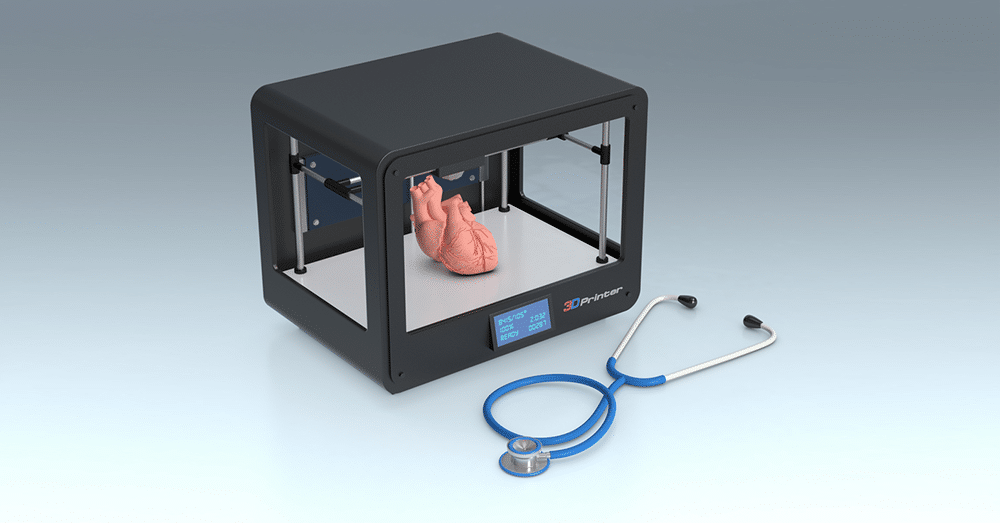
This technology brings wonders in all aspects of healthcare. With 3D-Printing, medical professionals can now print artificial limbs, medical tissues, blood vessels, pills, etc. This technique is highly used in skin grafting and surgical procedures of burnt patients.
As per the credible sources, pharma industry is also benefiting from this technology as FDA approved 3D-printed drugs have been in use since 2015.
Researchers are also working on 3D-printing of polypills. It contains several layers of drugs for patients to adhere to a therapeutic plan.
Conclusion
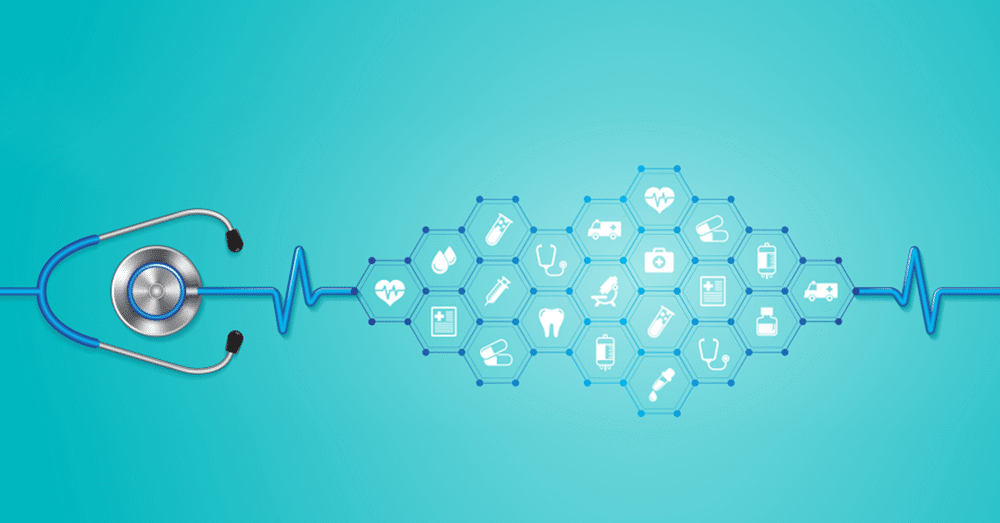
In this article, we have seen how the latest changes in technologies have helped the healthcare industry transform its future. With the amalgamation of health and technology, solutions for better and improved maintenance of health have erupted.
Be it telemedicine solutions like Practo or e-pharmacy solutions like 1mg, people’s lives have improved for a lot better. Now one can track its sleep, steps, eating habits, all with the benefits of mobile applications like Google Fit, Snore Lab, etc. Various mobile app development companies worldwide are working intensively to develop such useful applications for users.
Technologies like Artificial Intelligence, Machine Learning, Augmented Reality, Robotics, 3D-Printing, etc., are all helping in various healthcare industry domains. Be it drug development, patient care, surgical procedures, or medical researches, all the above-mentioned technological advancements are helping in every sphere.
The ongoing pandemic has also seen the health tech market grow with it. These times enabled people to see and experience the technologies; they never imagined to be a part of their lives. In the end, the technological advancements shaping our healthcare system should be accepted with full spirit, as the approach behind it is to improve the quality of life of an individual.




